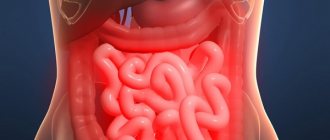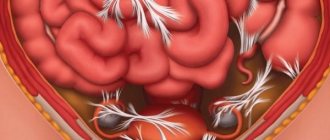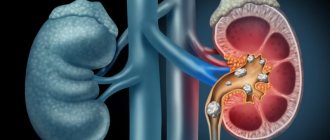A strict diet for stomach ulcers is a prerequisite for maintaining a person’s well-being. It is best to consult your doctor individually about whether you can drink coffee if you have a stomach ulcer.
After the necessary diagnosis and understanding of the picture of the disease, a specialist gastroenterologist will recommend the right foods and the form of their use, as well as a diet and fluid intake.
Based on test results, depending on the stage and complexity of the gastrointestinal tract disease, experts allow some patients to drink this drink, subject to certain rules.
Stomach ulcer is a fairly serious illness that affects both young and old people. A characteristic feature is a chronic course with periodic exacerbations. To prolong periods of remission, serious preventive measures are needed, which, first of all, consist of proper nutrition. Food should include a lot of protein foods. Spicy, sour, fatty and fried foods are contraindicated.
There are special diets that can help alleviate the disease. Is it possible to drink if you have an ulcer? This is also a rather serious question to which no definite answer can be given. If we are talking about water, then it should be noted that water is very useful for ulcers. You can drink it without restrictions, it helps to cope with pain for a while.
Can coffee cause ulcers?
Coffee, as a drink, does not cause ulcers if you drink it in small quantities and follow the basic principles of sensible nutrition. But it can contribute to the development of the disease (in the beginning, problems with heartburn usually arise; if you are not careful, it can lead to gastritis, and if you do not take action, only then does an ulcer appear).
That is, at the first signs of problems with the digestive system and the appearance of pain and discomfort, especially if they occur after drinking coffee, you need to carefully reconsider your diet.
Do not drink coffee on an empty stomach: with constant consumption, it greatly increases the risk of ulcers.
What can you drink if you have a stomach ulcer during periods of exacerbation? Here you need to be very careful, be sure to consult a gastroenterologist. In most cases, water, rosehip infusion and weak tea with milk are recommended.
Drinks for stomach ulcers, recommended during remission:
- Weak tea, coffee or cocoa with milk and sugar;
- Decoctions of raspberry and currant leaves;
- Teas from dried herbs (linden, chamomile);
- Rose hip decoction;
- Juices from non-acidic berries and fruits;
- Low-fat milk.
How does coffee affect the body for stomach and duodenal ulcers?
Caffeine stimulates the secretion of gastric secretions. If you drink coffee on an empty stomach, the juice is released and there is nothing to digest. Increased acidity and irritation of the walls lead to ulcers.
But it's not just the caffeine, otherwise you could just drink decaf coffee. Coffee also suppresses pepsin enzymes, and people with ulcers already have low levels of these enzymes. That is, coffee can make things much worse.
The grounds in coffee, even the smallest ones, quite irritate the walls of the stomach and intestines.
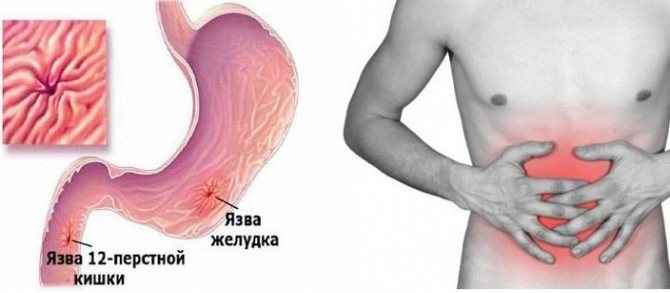
How to drink coffee correctly for gastritis
Those suffering from chronic gastritis who find it difficult to live without a cup of coffee should follow the recommendations given in order to minimize harm to their own stomach.
- During exacerbation of gastritis, drinking coffee is prohibited.
- Drinking coffee is prohibited if you have gastritis with high acidity.
- If the secretory function of the stomach is reduced, it is allowed to drink a small amount of a weak drink diluted with milk. In this case, the effect that increases gastric secretion is even useful.
It is not recommended to take more than a cup of your favorite tonic drink per day.
It is easy to determine individual sensitivity to coffee using a test. For the study, drink a cup of weak drink half an hour after eating. If after drinking a small amount a person does not feel worse, it is allowed to take a favorite drink that improves tone in small doses. If the condition worsens, heartburn and abdominal pain appear, it is not recommended to continue drinking coffee. If the acidity of the gastric juice is high, you should not drink coffee, even in small dosages.
Coffee on an empty stomach
Some people not only start their morning with coffee, but also prefer to drink it pure, undiluted. And they even often replace the main breakfast with it, which is fundamentally wrong. Drinking coffee on an empty stomach is harmful not only for ulcer patients, but also for healthy people. Coffee can be a great addition to breakfast, but it's just an addition. It is better for them to finish the meal; a heavy meal will neutralize the effect of caffeine. You should forget about the usual drinking and a glass of coffee on the run before work.
Why do doctors categorically not recommend taking this product on an empty stomach? The effect of caffeine in this case is much stronger; the production of hydrochloric acid in gastric juice increases significantly. Normally, it affects the food eaten and is used to digest it. But when it enters an empty stomach, it directly affects the walls of this organ, gradually corroding them. This is one of the causes of gastritis or peptic ulcer. Therefore, it is recommended that even healthy people forget about drinking the drink on an empty stomach. And even more so for patients with a diagnosed disease.
Therefore, the main rule of morning coffee is to drink it only after a hearty breakfast, weakly brewed and with milk.
How does coffee affect the stomach: benefit or harm?
There are many opinions regarding the effect on the gastrointestinal tract, both good and bad. Some people believe that coffee has a beneficial effect on the digestive system, as it promotes the absorption of food. Others are of the opinion that caffeine helps in the process of losing weight, prevents a number of diseases, and even reduces the risk of cancer. The drink improves the functioning of the cardiovascular system.
Very important! Savina G.: “I can recommend only one remedy for the quick treatment of ulcers and gastritis” read more.
The liquid is most active in the stomach. Regarding the negative impact on this organ, the opinions of scientists are divided. Some believe that the coffee drink is only dangerous on an empty stomach, while others are confident that the negative impact of the drink does not depend on any factors. There is an opinion that, on the contrary, it has a positive effect on the stomach.
The drink contains not only caffeine, but also chrogenic acid. This substance makes the hostile environment in the organ more acidic, which can cause heartburn. This acidic substance irritates the lining of the stomach, so the drink should not be drunk on an empty stomach, especially if you do not eat anything afterwards. Because if the acid cannot digest anything, it begins to destroy the walls of the organ. This may cause pain.
The development of gastritis is possible if you regularly drink coffee on an empty stomach.
If you drink coffee for a long time on an empty stomach, it can cause gastritis, peptic ulcers, which can turn into cancer. The safest varieties are those that do not contain N-alkol-5-hydroxytryptamide, catechol or caffeine.
THIS IS REALLY IMPORTANT! Right now you can find out a cheap way to get rid of stomach pain. FIND OUT >>
The most negative effect of coffee on the digestive system is in women under 35 years of age who drink it frequently. It has been proven that the effect of this drink directly depends on the variety and quality of the grains. Some varieties, on the contrary, block the production of hydrochloric acid.
Reasons for avoiding coffee if you have a stomach ulcer
Strongly brewed coffee often leads to gastritis and ulcers due to the following characteristics:
- Drinking on an empty stomach, this drink causes the release of hydrochloric acid, which corrodes the walls of the organ. Over time, the disease becomes more serious, which brings a lot of inconvenience to the sick person. The attacks become more frequent. In addition, their pain and intensity also tend to increase.
- Peptin levels decrease with large amounts of coffee consumed, which is dangerous even for people with a healthy stomach. People suffering from gastrointestinal diseases are even more susceptible to the effects of peptin, since existing ulcers react to it more painfully.
Positive Action
Unique grains were highly valued in Asian countries, where they received their recognition and love. Did our ancestors know that coffee has a beneficial effect on the intestines? Today experts are convinced of the benefits of the drink.
Antimicrobial and anti-inflammatory effect
The positive effect of the aromatic liquid occurs due to its antioxidant properties. It is these qualities, which are no less than in vegetables, fruits or green tea, that will help overcome spring vitamin deficiency and strengthen protective functions during the cold season.

As a laxative
Many patients use this tasty drug for constipation. It is useful to take it as a cleansing before a diagnostic operation - colonoscopy. You just need to take into account that the effect of coffee as a laxative will be immediate, stimulating the emptying of the intestines and stomach, so undigested food will quickly enter the small intestine. Thus, not all the nutrients from this food are used by the body.
With prolonged absence of stool
Espresso, latte, cappuccino - any of these drinks will undoubtedly make bowel movements easier. To avoid negative consequences, follow the rules:
- Drink no more than two cups of coffee per day.
- If you have constipation, you can drink the drink an hour after meals.
- A glass of water would be helpful. In this way, acid plaque will be washed off from the teeth and the excreted fluid will be replenished.
- Coffee for constipation has an irritating effect on the mucous membrane.
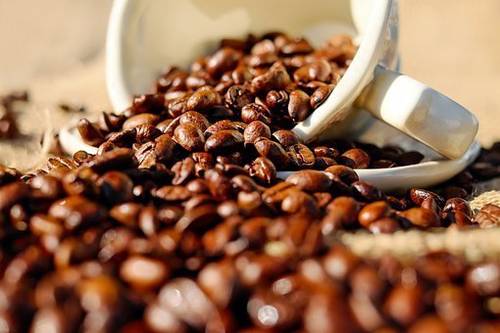
Advice from doctors
With all the love for the drink, it cannot be said that its effects are the same for everyone. In particular, the presence of gastrointestinal diseases forces you to listen to the doctor’s recommendations:
- coffee affects the level of hydrochloric acid in the stomach, so people with ulcers and hyperacid gastritis need to consume it in doses;
- You should not drink strong espresso on an empty stomach if you suffer from gastrointestinal diseases;
- to get rid of heartburn, add milk to a cup;
- Pregnant women are not recommended to abuse the aromatic liquid;
- It is undesirable to drink coffee for people experiencing depression or mental disorders - scientific research has led to such conclusions;
- The invigorating drink can only be consumed by adults; it is contraindicated for children;
- It is not advisable to drink coffee for elderly people suffering from hypertension, as the liquid can negatively affect the heart rate.
Read also: Water fasting 2 days reviews

Strong and black, as a cause of exacerbation
If you didn’t take care of your stomach and “earned” an ulcer, and you didn’t stop loving coffee, then you’ll have to give up the drink completely if you don’t want frequent exacerbations, or drink it weakly, but not at times of exacerbation of the disease.
In order not to “tease” your ulcer and give it time to calm down for a while, it is better to stop drinking coffee. The production of hydrochloric acid remains the priority function of caffeine, and the less of it gets into the stomach affected by the disease, the greater the chance of faster scarring of the ulcers and a return to the usual lifestyle and diet.
What else is the risk of drinking coffee for an ulcer?
Exacerbation of gastric ulcers is facilitated by a decrease in peptin levels, and drinking a large amount of drink actually lowers it, which cannot but be risky even for healthy people and, even more so, for those suffering from ulcers.
However, doctors allow patients with peptic ulcers to drink coffee. But provided that the amount of the drink does not exceed two small cups per day, the coffee will not be instant, but natural, its grinding will be fine (to avoid injury to the walls of the stomach by too large particles if they get inside), the coffee drink will not be strong.

Harm from coffee
There are two opinions regarding the effect of invigorating liquid on the digestive system. Some scientists believe that coffee is an excellent antioxidant and prevents the development of cancer, while others are confident that it promotes cancer in the gastrointestinal tract. The liver does not perceive this drink as food, so it spends a lot of energy fighting the components, which can cause exhaustion.
Read also: Beer for pregnant women
The absorption of calcium depends on the consumption of such liquid, since coffee interferes with this process. Based on this, it should be drunk an hour after calcium. If young people drink a lot of the drink, they can develop osteoporosis and their posture deteriorates, as calcium is washed out of the body. Coffee has diuretic properties, which increases the risk of dehydration. The drink quenches thirst without saturating the body with the necessary fluid.
How to drink coffee if you have a stomach or duodenal ulcer?
Remember the basic recommendations:
- Do not drink coffee on an empty stomach;
- Do not drink strong black coffee;
- Do not drink more than 2 cups of coffee per day.
Separately, it is worth mentioning instant coffee for ulcers. Instant coffee with or without caffeine, even the most expensive, organic and seemingly high-quality, is strictly contraindicated! It contains dyes, emulsifiers, flavors, taste and smell enhancers, preservatives and similar chemicals, which have an extremely negative effect on the gastrointestinal tract.
In a state of confident remission, you can sometimes allow yourself weak natural coffee with milk. It should not be hot or ice cold, prefer warm coffee. Alternatively, you can prepare espresso or ristretto (they contain a minimal amount of caffeine) and dilute it in a cup with warm water or milk.
Do not let coffee grounds get into the cup. Use either special filters or a coffee machine. You will have to give up Turkish coffee, or filter it carefully (but it has a lot of caffeine, so this is still not the best option).
Types of coffee and gastritis
The concentration of tannins in beans and ground coffee is much lower than in instant coffee. Nutritionists consider it less dangerous to health, but this does not mean that you can drink it all the time:
- in case of acute gastritis, coffee must be completely excluded from the diet;
- for chronic hypoacid gastritis, you can treat yourself to a drink by first adding a little milk to the cup;
- Do not drink too hot or ice coffee;
- the optimal time to drink a cup of drink is 30 minutes after a meal;
- Coffee in any form is prohibited for hyperacid gastritis.
Recommendations for drinking coffee for people with stomach diseases
In the case when a peptic ulcer leaves its mark, but you don’t want to give up this drink completely.
It must be used carefully, adhering to the following rules:
- Don't drink coffee on an empty stomach. A light breakfast and a snack are required, which will be a “barrier” to the production of hydrochloric acid in the stomach. This could be a sandwich, an omelet, or a vegetable salad. Coffee should serve as a light addition to the morning meal, and not as the first and/or main “course”.
- A complete exception to breakfasts consisting only of coffee. Many patients of gastroenterologists become such patients precisely for this reason. A lifestyle that involves the habit of “forgetting” about food cannot but affect the functioning of the body and its organs over time.
- Try not to eat “on the run”, in a hurry. Typically, such situations provoke the intake of food and liquids that do not correspond to the diet. It is best to eat small portions, according to the principle of fractional meals, several times a day. Eating frequently and in small portions is better accepted by the body than two large meals.
- Do not drink coffee during an exacerbation of the disease. This can cause additional ulceration on the walls of the stomach, which is dangerous for well-being and overall health. In the acute stage of the disease, it is optimal to completely exclude the drink from your diet, thereby allowing the ulcers to heal and prolong. Then you can carefully return to your usual diet and favorite drinks, naturally, after the permission of the treating specialist. It is even better to follow the diet prescribed by your doctor not only during the acute stage of the disease, but on a permanent basis. Light food that is not aggressive to the walls of the stomach, with a minimum amount of salt and spices, which can also cause increased production of gastric juice, has never harmed anyone.
- It is better to choose natural rather than instant coffee. The latter should be finely ground, since large particles of crushed coffee beans can cause additional irritation of the stomach walls. This rule also applies to the entire diet of a patient with gastritis or ulcers. A strict diet, preferably the most soft or pureed food, will minimize attacks of the disease, allowing you to live as comfortably as possible.
- A maximum of 2 cups of your favorite drink per day - a coffee lover with an ulcer or gastritis should not allow himself more than this portion per day. A larger amount will cause a reaction in the main digestive organ, and the disease may worsen.
It must be remembered that excessively strong coffee is an additional burden to the very fact of taking it. Medium strength, diluted with milk - the best option in this case.
Since many people are addicted to coffee, and it is really difficult to give it up, it is important to follow the recommendations of doctors, avoid violating these rules in the diet, and try to take the most healthy foods.
An excellent way to maintain a healthy stomach, but not give up your favorite taste and aroma, is to replace coffee with chicory or cocoa with milk. A coffee drink is also an excellent alternative.
A gastroenterologist who will be able to see the full picture of the disease after diagnosing the patient will help you decide on the best replacement option.
The safer the food and liquids consumed are for the walls of the stomach, the better the general health of the patient with peptic ulcer will be. An extra mug of aromatic hot drink can darken your mood for a long time and adjust your plans in a far from optimal way. People should not forget about this when following their weaknesses.
Effects of coffee on the stomach

Pain after drinking occurs in a number of cases, one of which is when consumed on an empty stomach. If there is no food to digest, the acid attacks the empty walls aggressively, causing painful spasms. Pain appears when a person has eaten a heavy meal and immediately after eating drinks a cup of espresso or Americano.
The effect of coffee on the stomach has been studied in detail for many years, after which a disappointing conclusion was made: caffeine can cause unpleasant pain in the gastrointestinal tract. Sharp pain is provoked by the use of grains of certain varieties and degrees of roasting:
- Light roasted beans. By treating the grains at low temperatures, most of the acids remain in the beans. During the cooking process, acids pass into the drink.
- “Sour” grains, which include the popular Arabica. It is dangerous to consume Arabica beans with the label “Washed” on the packaging.
On a note! Acids pass from the ground powder into the drink with certain preparation methods: brewing directly in a cup, using a Turk, or a French press.
Coffee in the morning on an empty stomach and the gastric mucosa
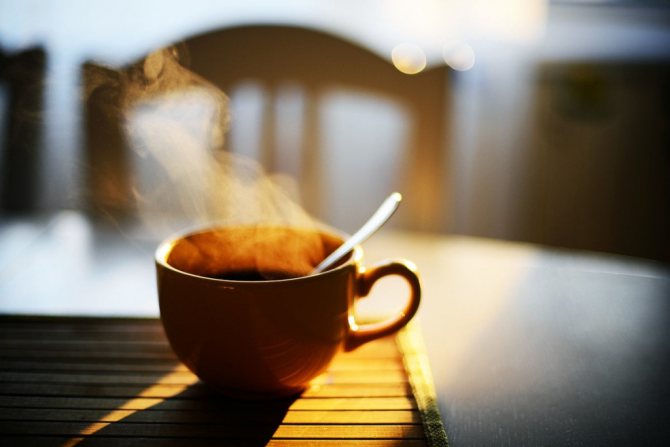
Grains contain a number of chemical compounds that negatively affect the stomach. Chlorogenic acids irritate the gastrointestinal mucosa, which can lead to gastritis or even ulcers. Drinking the drink on an empty stomach makes the situation worse. If you drink it without first eating, discomfort appears in the stomach immediately after coffee.
Gastritis is accompanied by abdominal upset, painful spasms, heaviness, and belching. If measures are not taken, gastritis can develop into an ulcer. It is a hole in the mucous membrane and is accompanied by prolonged pain.
Is coffee bad for the stomach?
The following organs are affected by chlorogenic acid:
- Pancreas;
- Stomach;
- Liver.
Drinking the drink immediately after waking up is especially dangerous. The stomach is completely empty of its contents at night, and the mucous membrane immediately reacts to the effects of acid, resulting in pain, heartburn, and belching. Bloating is common after drinking coffee.
Since caffeine consumption quickly becomes an addiction, coffee drinkers tend to drink the drink on an empty stomach. When they wake up, they immediately brew a cup of their favorite drink, forgetting to have breakfast beforehand. Few people think about how much harm coffee causes to the stomach. As a result, most eventually begin to suffer from gastritis, which can develop into ulcers or even cancer.
In addition, coffee is dangerous for the stomach because any hot liquid irritates the mucous membrane, which increases mucus production.
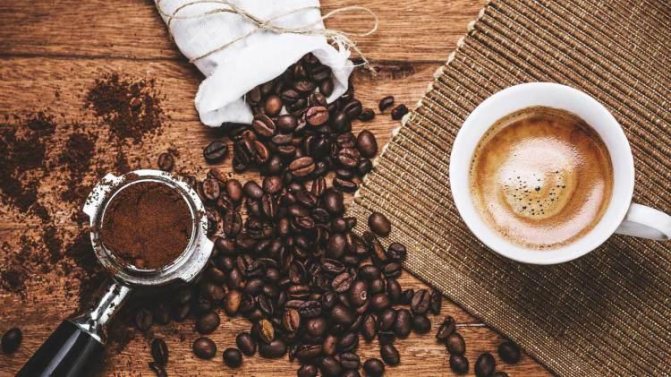
Coffee can cause stomach pain
How to choose coffee?
The benefits and harms of the drink directly depend on its variety. Patients with digestive disorders should choose drinks more carefully in order to establish quality nutrition.
Depending on the tree from which the beans are collected, coffee is divided into two types: Robusta and Arabica. Robusta is cheaper, but it is rich in caffeine. Therefore, patients with stomach ulcers should choose a softer Arabica coffee. In addition, it has a richer taste and is not bitter, unlike robusta. Therefore, it is highly valued by coffee lovers. To reduce the cost, manufacturers can use a mixture of two types of grains, but a pure drink will be healthier.

The drink reaches the buyer after processing, including roasting and grinding. Roasting affects the taste: the stronger it is, the richer and more bitter the taste will be. Much more important for people who care about their health is grinding. As already mentioned, the smaller it is, the more useful it is. Fine grind beans are prepared in a coffee machine; for cezve, ultra-fine is recommended. This coffee can be purchased at a specialty store or prepared at home if you have a mill.
If you purchase a drink with flavors, you should give preference to nutmeg, cinnamon, and vanilla because of their natural composition. Alcohol, chocolate and nut flavors are not recommended, as they are synthesized and may be poorly accepted by the stomach.
Conclusion
- Coffee does not cause peptic ulcers, but together with other factors it can contribute to its development.
- It is forbidden to drink coffee on an empty stomach, instant coffee, hot coffee, or during the acute phase of the disease.
- For chronic stomach and duodenal ulcers, natural coffee is acceptable, but only after meals, with milk or diluted with water.
- Always consult your doctor: is it worth drinking coffee in small doses at this stage of the disease? A specialist can better see the dynamics of the disease. And of course, listen to your own feelings.
List of references: https://zds.com.ua/news-mozhno-pit-coffee-gastrit-jazvy-zheludka https://newsarmenia.am/news/science/kofe-kak-prichina-yazvy-i-gastrita- pit-ili-ne-pit/ https://znaj.ua/ru/society/193915-piti-chi-ne-piti-likari-podililisya-sekretom-yak-uniknuti-shkodi-vid-kavi https://farm .tatarstan.ru/rus/index.htm/news/1407692.htm https://ru.wikipedia.org/wiki/Stomach_ulcer Notes from the author of the article, based on personal experience. This material is purely subjective and is not a guide to action. Only a qualified specialist can determine an accurate diagnosis and prescribe treatment.
Last modified: 03/18/2020
